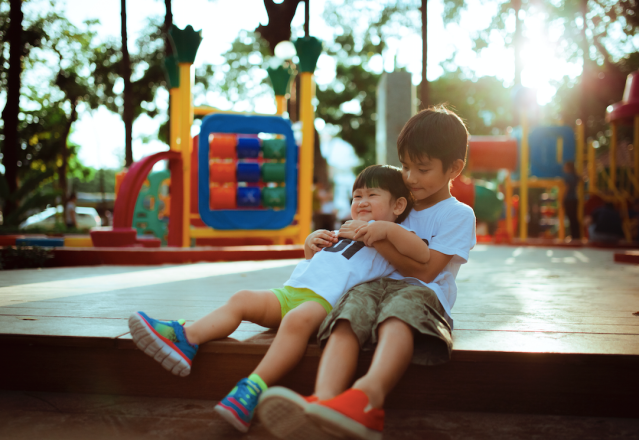At some point, every parent watches their child struggle to engage in successful play, get along with other children, make friends, and keep them. Whether it’s a phase where a child struggles or has a recurring problem, watching this struggle is painful for all parents. Helping your child to develop the social skills to play better is a key component in helping them to have positive relationships throughout their life. Children are learning not just to play better; they are learning to live better later on as they take those skills into every workplace and every interaction in the future. Some children need more direct instruction and help than others to learn how to play with different children and to improve their social skills.
Here Are Five Ways to Help Your Elementary School Age Child Play Better:
1. Teach your child the skills she needs. Ask yourself what your child tends to struggle with during play such as joining in, sharing, managing emotions, becoming overly excited with a friend, being too bossy, or being too grumpy. Then work on that skill and make it clear to your child that she has one mission for the play date or outing—practice that skill. For example, work on how your child can approach other children, what to say and what to do, role play and practice approaching kids with family members and then help her join in with friends or people she knows.
2. Seek playmates who are compatible. Pick a playmate whose temperament will allow your child a chance to play better and to practice the social behaviors you are working on. Compatibility does not necessarily mean putting two like-minded children together. For example, two overly bossy, rule-oriented children might argue and a domineering child might overshadow a shy child.
3. Pick an environment and activity that fosters positive play. Picking the right location and environment that supports your child’s mission is key to helping them put their best foot forward. Try to host the playdate so you can help shape the environment and remove toys or activities that have caused problems in the past. What is an activity my child enjoys? Will it be a structured or unstructured environment? In what environment does my child do well? Where do I have the most success with them? At home? A park or playground? A crowded bounce park where your child may be overstimulated may not be the best place to have a play date.
4. Help your child become a social observer. Build your child’s noticing and observation skills by having them be a social spy. Your child will rehearse with you ahead of time, then spy covertly on others to obtain key social information. Most children who struggle with social skills don’t stop to notice the important cues such as what they talk about at lunch, how loud other kids are on a train or in a museum, what their teacher does with their body language and tone of voice when they are frustrated.
5. Debrief after your child’s playdate. Children learn by reflecting on what they are doing and how it impacts others. Engage with your child, talk about the playdate in a nonjudgmental way. After the playdate is over, spend some time chatting with your child about what they did well and celebrate their effort saying, I heard you telling Leslie what to do and what game to play. Ask your child to consider the feelings of her playmate, asking her what do you think Leslie felt when you told her what to choose? What choices did Leslie get to make? What choices did you get to make? Let’s look at whether or not that was fair together. Then also ask your child what they struggled with and make a plan and practice for the future.
The more you pay attention to something the more it grows. Some children struggle with aspects of play and need more direct instruction and guidance to learn these skills. The more your child practices and gains confidence, the more she can feel comfortable in her own skin.











